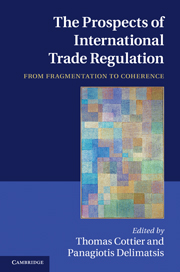Book contents
- Frontmatter
- Contents
- List of figures
- List of tables
- Contributors
- Preface and acknowledgements
- Table of cases
- List of abbreviations
- Introduction: fragmentation and coherence in international trade regulation: analysis and conceptual foundations
- PART I Constitutional issues in international trade regulation
- PART II Reforming specific areas of trade regulation
- PART III ‘Trade and…’ linkages
- 8 A call for a WTO ministerial decision on trade and human rights
- 9 The protection and promotion of cultural diversity in a digital networked environment: mapping possible advances towards coherence
- 10 Development and stability in the nexus between trade and finance
- 11 The regulatory framework of international investment: the challenge of fragmentation in a changing world economy
- 12 Low-income countries and commodity price volatility
- Index
- References
11 - The regulatory framework of international investment: the challenge of fragmentation in a changing world economy
from PART III - ‘Trade and…’ linkages
Published online by Cambridge University Press: 26 April 2011
- Frontmatter
- Contents
- List of figures
- List of tables
- Contributors
- Preface and acknowledgements
- Table of cases
- List of abbreviations
- Introduction: fragmentation and coherence in international trade regulation: analysis and conceptual foundations
- PART I Constitutional issues in international trade regulation
- PART II Reforming specific areas of trade regulation
- PART III ‘Trade and…’ linkages
- 8 A call for a WTO ministerial decision on trade and human rights
- 9 The protection and promotion of cultural diversity in a digital networked environment: mapping possible advances towards coherence
- 10 Development and stability in the nexus between trade and finance
- 11 The regulatory framework of international investment: the challenge of fragmentation in a changing world economy
- 12 Low-income countries and commodity price volatility
- Index
- References
Summary
KEY MESSAGES
∙ International investment regulation is fragmented since this field is multilayered and multifaceted, made in substance of obligations differing in geographical scope and coverage and constituting an intricate web of commitments that partly overlap and partly supplement one another. The increasing importance of foreign direct investment (FDI) makes the current legal situation unsatisfactory.
∙ Multilateral failures to negotiate an investment agreement may rather be considered an indication of the importance of multilateral regulations on investment and of the fact that governments have not yet identified an appropriate negotiating agenda.
∙ Several initiatives have been contemplated such as the Policy Framework for Investment (PFI) proposed by the Organisation for Economic Co-operation and Development (OECD). The PFI may contribute to a more coherent international policy framework on investment.
∙ Despite the ongoing globalisation process, FDI (still) seems to have a rather regional dimension instead of a truly global one. FDI flows and multinational enterprises' (MNEs) strategies are regional by nature.
∙ MNEs from emerging markets change the political economy game of negotiating International Investment Arrangements (IIAs) and are increasingly becoming key stakeholders. The presence of MNEs from developing countries, such as Chinese FDI, may also influence the expectations and the attitudes of the civil society towards IIAs.
∙ The rise of state-owned enterprises (SOEs) and of sovereign wealth funds (SWFs) from emerging countries, such as China, have effects on the political responses (protectionism on the rise), at the national level as well as at the international ones (control of protectionism). […]
- Type
- Chapter
- Information
- The Prospects of International Trade RegulationFrom Fragmentation to Coherence, pp. 417 - 451Publisher: Cambridge University PressPrint publication year: 2011



